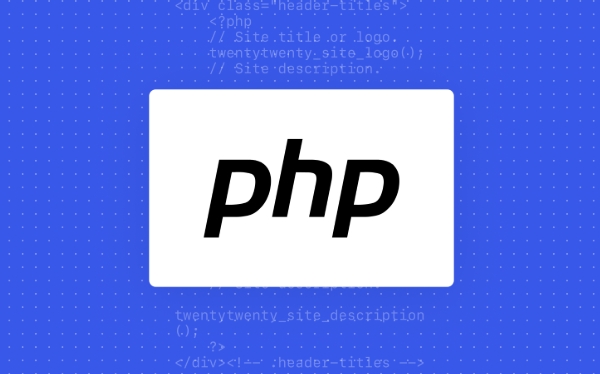 Backend Development
Backend Development
 PHP Tutorial
PHP Tutorial
 Mitigating Common Vulnerabilities by Sanitizing Superglobal Inputs
Mitigating Common Vulnerabilities by Sanitizing Superglobal Inputs
Mitigating Common Vulnerabilities by Sanitizing Superglobal Inputs
Aug 03, 2025 am 10:33 AMAlways validate and sanitize superglobal inputs using functions like filter_input() or filter_var() to ensure data meets expected criteria and is free of malicious content. 2. Use prepared statements with parameterized queries when handling database operations to prevent SQL injection, even after validating input. 3. Escape output with htmlspecialchars() when displaying user-supplied data in HTML to protect against cross-site scripting (XSS) attacks. 4. Handle file uploads securely by generating unique filenames, validating MIME types using finfo, and restricting allowed file types. 5. Treat $_SERVER values with caution, avoiding direct use in security logic due to spoofing risks. 6. Apply the principle of least privilege by accepting only necessary input and rejecting or sanitizing everything else. Properly sanitizing and validating all superglobal data upon entry is essential for building secure PHP applications.

One of the most critical aspects of secure PHP development is properly handling superglobal variables like $_GET, $_POST, $_REQUEST, $_COOKIE, and $_SERVER. These inputs are direct entry points for user data and, if used without proper sanitization, can expose applications to common vulnerabilities such as SQL injection, cross-site scripting (XSS), and command injection. Mitigating these risks starts with sanitizing and validating all superglobal inputs before using them.

Validate and Sanitize Input Early
The first line of defense is to never trust user input. Every value retrieved from a superglobal should be treated as untrusted and potentially malicious. Two key practices help reduce risk: validation and sanitization.
- Validation ensures the input matches expected criteria (e.g., type, format, range).
- Sanitization cleans the data to remove or escape potentially harmful content.
For example, if expecting an integer from $_GET['id']:

$id = filter_input(INPUT_GET, 'id', FILTER_VALIDATE_INT);
if ($id === false) {
die('Invalid ID');
}Using filter_input() or filter_var() leverages PHP’s built-in filter extension, which provides safe, consistent ways to validate and sanitize different data types.
Protect Against SQL Injection
Unsanitized superglobal data passed directly into SQL queries is a leading cause of SQL injection. Always use prepared statements with parameterized queries instead of concatenating input.

For example, using PDO:
$stmt = $pdo->prepare("SELECT * FROM users WHERE id = ?");
$stmt->execute([$_GET['id']]); // Safe with prepared statementsEven with prepared statements, it's still wise to validate $_GET['id'] as an integer first. Defense in depth ensures that even if one layer fails, others are still protecting the system.
Prevent Cross-Site Scripting (XSS)
When outputting data from superglobals (e.g., $_POST['comment']) into HTML, always escape it to prevent XSS attacks.
Use htmlspecialchars():
echo '<p>' . htmlspecialchars($_POST['comment'], ENT_QUOTES, 'UTF-8') . '</p>';
Additionally, sanitize input on arrival if storing it. For instance, strip or encode HTML tags depending on context:
$clean_comment = filter_input(INPUT_POST, 'comment', FILTER_SANITIZE_STRING);
Note: FILTER_SANITIZE_STRING is deprecated as of PHP 8.1. For newer versions, use explicit methods like htmlspecialchars() or HTML purification libraries (e.g., HTML Purifier) for rich content.
Secure Handling of File Uploads and Server Data
$_FILES and $_SERVER are also superglobals that require caution.
- For file uploads, never trust
$_FILES['name']. Always generate a new filename and validate file type using MIME detection (not just extension). - With
$_SERVER, avoid using values likeHTTP_USER_AGENTorREMOTE_ADDRdirectly in output or security decisions without scrutiny. Spoofing is common.
Example of safer file handling:
$uploadDir = '/uploads/';
$fileName = basename($_FILES['file']['name']);
$filePath = $uploadDir . uniqid() . '_' . pathinfo($fileName, PATHINFO_EXTENSION);
// Validate MIME type
$finfo = finfo_open(FILEINFO_MIME_TYPE);
$mimeType = finfo_file($finfo, $_FILES['file']['tmp_name']);
$allowedTypes = ['image/jpeg', 'image/png', 'image/gif'];
if (in_array($mimeType, $allowedTypes)) {
move_uploaded_file($_FILES['file']['tmp_name'], $filePath);
} else {
die('Invalid file type');
}Summary of Best Practices
To mitigate vulnerabilities from superglobal inputs:
- Always validate and sanitize input using PHP’s filter functions or custom logic.
- Use prepared statements for database queries.
- Escape output with
htmlspecialchars()to prevent XSS. - Never trust
$_SERVERvalues for security enforcement. - Handle file uploads securely by validating type and renaming files.
- Apply the principle of least privilege—only accept what you need, nothing more.
Basically, treat every superglobal as a potential threat vector. Sanitizing inputs early and consistently is not just good practice—it's essential for building secure PHP applications.
The above is the detailed content of Mitigating Common Vulnerabilities by Sanitizing Superglobal Inputs. For more information, please follow other related articles on the PHP Chinese website!

Hot AI Tools

Undress AI Tool
Undress images for free

Undresser.AI Undress
AI-powered app for creating realistic nude photos

AI Clothes Remover
Online AI tool for removing clothes from photos.

Clothoff.io
AI clothes remover

Video Face Swap
Swap faces in any video effortlessly with our completely free AI face swap tool!

Hot Article

Hot Tools

Notepad++7.3.1
Easy-to-use and free code editor

SublimeText3 Chinese version
Chinese version, very easy to use

Zend Studio 13.0.1
Powerful PHP integrated development environment

Dreamweaver CS6
Visual web development tools

SublimeText3 Mac version
God-level code editing software (SublimeText3)
 Navigating Data Submission: A Comparative Analysis of $_GET, $_POST, and $_REQUEST
Aug 03, 2025 am 07:13 AM
Navigating Data Submission: A Comparative Analysis of $_GET, $_POST, and $_REQUEST
Aug 03, 2025 am 07:13 AM
$_GETretrievesdatafromURLparameters,isvisibleandbookmarkable,suitablefornon-sensitive,idempotentoperationslikesearchorfiltering.2.$_POSTsendsdataintherequestbody,offersprivacyandhighercapacity,idealforsecure,state-changingactionslikeformsubmissionsor
 The Definitive Guide to Mastering File Uploads with the $_FILES Superglobal
Aug 05, 2025 pm 01:36 PM
The Definitive Guide to Mastering File Uploads with the $_FILES Superglobal
Aug 05, 2025 pm 01:36 PM
The core of file upload is to verify errors, confirm file types, rename and safely move files. 1. First check whether $_FILES['error'] is UPLOAD_ERR_OK; 2. Use finfo to detect the real MIME type instead of trusting client data; 3. Verify file extensions and limit allowed types; 4. Rename files with random names such as bin2hex(random_bytes(16)) to prevent path traversal; 5. Move files from temporary directories to secure upload directories through move_uploaded_file(); 6. The storage location should be located outside the web root directory as much as possible, and if it needs to be disclosed, script execution will be disabled; 7. Use GD or
 Architecting for Testability: Isolating Superglobals in Modern PHP Applications
Aug 04, 2025 am 06:28 AM
Architecting for Testability: Isolating Superglobals in Modern PHP Applications
Aug 04, 2025 am 06:28 AM
To improve the testability of PHP applications, it is necessary to isolate the direct use of hyperglobal variables, because hyperglobal variables such as $_GET, $_POST, $_SESSION, etc. belong to the global state, which will cause code-coupled environments, difficulty in simulated inputs, and state leakage between tests; 1. Use standard request objects such as PSR-7 or SymfonyHttpFoundation to encapsulate input data at the entrance to avoid business logic directly accessing hyperglobal variables; 2. Define interfaces (such as SessionInterface) for sessions and cookie operations and dependency injection to facilitate replacement with simulated implementation during testing; 3. Encapsulate environment data such as $_SERVER in a dedicated class, accessed through object methods to ensure that it can be
 Mitigating Common Vulnerabilities by Sanitizing Superglobal Inputs
Aug 03, 2025 am 10:33 AM
Mitigating Common Vulnerabilities by Sanitizing Superglobal Inputs
Aug 03, 2025 am 10:33 AM
Alwaysvalidateandsanitizesuperglobalinputsusingfunctionslikefilter_input()orfilter_var()toensuredatameetsexpectedcriteriaandisfreeofmaliciouscontent.2.UsepreparedstatementswithparameterizedquerieswhenhandlingdatabaseoperationstopreventSQLinjection,ev
 The Anatomy of a Web Request: How Superglobals Map to the HTTP Protocol
Aug 04, 2025 pm 12:40 PM
The Anatomy of a Web Request: How Superglobals Map to the HTTP Protocol
Aug 04, 2025 pm 12:40 PM
PHP hyperglobal variables such as $_GET, $_POST, $_SERVER directly map each part of the HTTP request: 1. $_GET corresponds to URL query string, such as ?term=apple&page=2, will populate to $_GET['term'] and $_GET['page'], the data can be seen in the URL and is not suitable for sensitive information; 2. $_POST processes form data in the POST request body, such as username and password, the data is not in the URL, and it can be transmitted a large amount of it but requires HTTPS to ensure security; 3. $_SERVER contains request metadata, such as REQUEST_METHOD corresponds to HTTP method, HTTP_H
 Advanced Superglobal Techniques for Complex Form and API Handling
Aug 04, 2025 pm 02:44 PM
Advanced Superglobal Techniques for Complex Form and API Handling
Aug 04, 2025 pm 02:44 PM
Wrapsuperglobalsinarequestobjecttoimprovetestabilityandmaintainability;2.Alwaysvalidateandsanitizeinputusingstructuredmethodsorlibraries;3.Abstractfileuploadswithadedicatedclasstocentralizesecuritychecks;4.ImplementCSRFprotectionforformsanduseauthent
 The $GLOBALS Array vs. The `global` Keyword: A Performance and Scope Analysis
Aug 05, 2025 pm 06:24 PM
The $GLOBALS Array vs. The `global` Keyword: A Performance and Scope Analysis
Aug 05, 2025 pm 06:24 PM
Theglobalkeywordisslightlyfasterthan$GLOBALSduetodirectsymboltablebinding,buttheperformancedifferenceisnegligibleinmostapplications.2.$GLOBALSprovidesdirectaccesstotheglobalsymboltableandallowsunsettingglobalvariablesfromwithinfunctions,whileglobalon
 From `register_globals` to Filter Functions: The Evolution of Superglobal Security
Aug 05, 2025 am 04:40 AM
From `register_globals` to Filter Functions: The Evolution of Superglobal Security
Aug 05, 2025 am 04:40 AM
Thedeprecationofregister_globalsandtheadoptionoffilterfunctionsmarkedapivotalshiftinPHP’ssecurityevolution;1.register_globalswasremovedduetoitsvulnerabilitytovariableinjection,allowingattackerstomanipulatescriptvariablesviaURLsorcookies;2.theriseofsu





